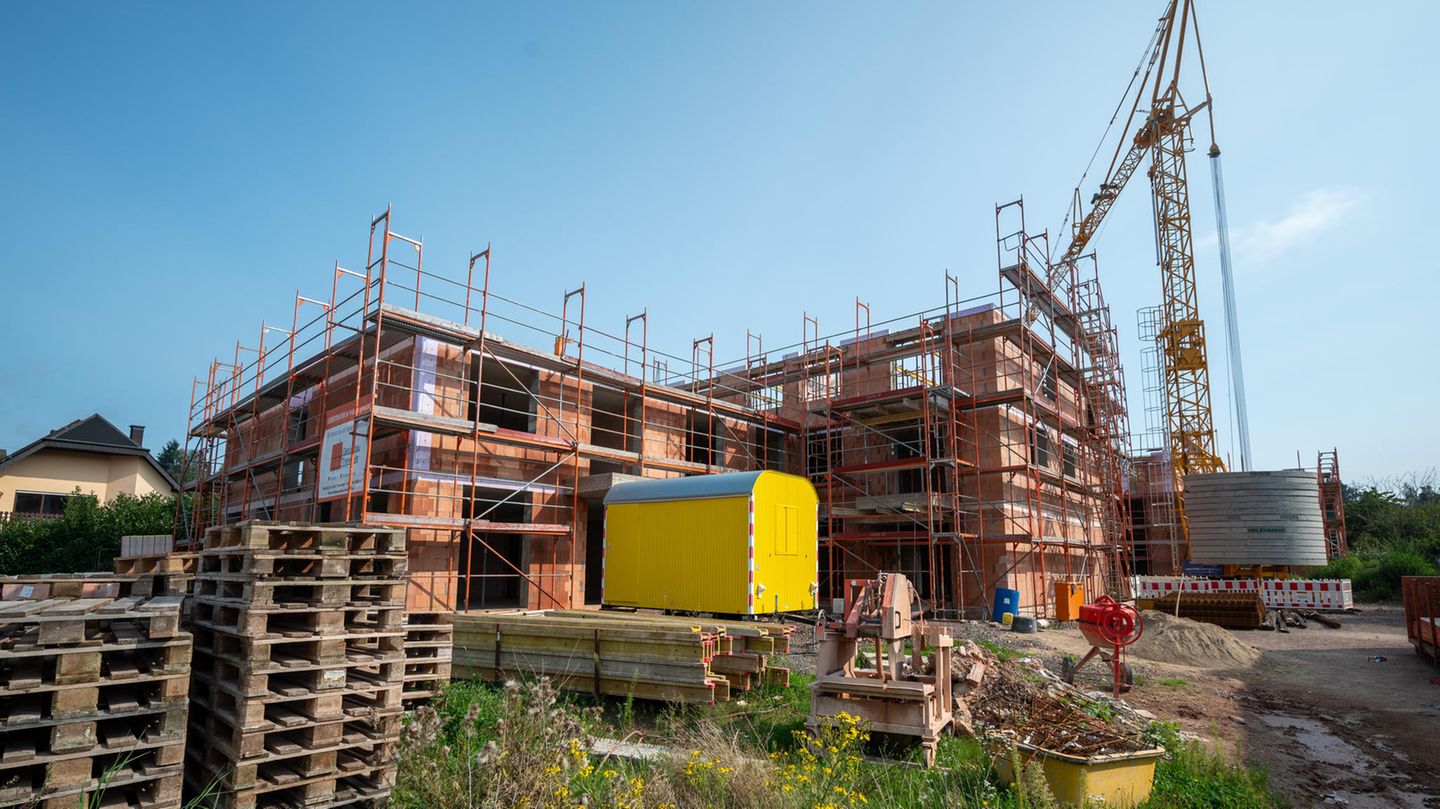Germany has a housing crisis. Combating them will be the focus of the Chancellery on Monday. It’s a crisis meeting that some people wrote off even before it started. However, the government has a plan.
There is a permanent crisis in housing construction. There has been a lack of housing in Germany for years. But instead of building like crazy, projects are now being canceled. Families give up their dream of owning a house because of high costs, and companies go bankrupt. Tenants, owners, the construction industry – they all give the federal government a catastrophic report.
At a meeting in the Chancellery on Monday, they should all come together at the table and develop a plan on how more apartments can be built quickly and cheaply. The federal government is moving forward with a 14-point plan. But the required economic stimulus program in the double-digit billion range is hardly to be expected.
Why is Germany not making progress in housing construction?
The basic problem is well known: there has been a lack of living space in Germany for years, especially in metropolitan areas. Prices shot up due to low supply in both the rental and purchase markets. The traffic light government has therefore set itself the goal of creating 400,000 new apartments per year. But this goal keeps breaking her down. In 2022 there were almost 300,000, and the construction industry is expecting 230,000 to 250,000 new apartments this year. Next year it will be less than 200,000.
The main problem is the explosion in building interest rates since the start of the Ukraine war. Where less than one percent was required two years ago, today it is four. Added to this are high inflation and high material costs. Fewer and fewer private individuals can afford to build. Building applications, property sales, planning – everything is plummeting.
How have rents and purchase prices developed recently?
There have been hardly any affordable rental apartments in major cities for a long time. Recently, however, asking rents in smaller cities have risen even more sharply in percentage terms. This was most noticeable last year in Delmenhorst in Lower Saxony with an increase of 13.2 percent.
Purchase prices, on the other hand, have recently fallen more sharply than at any time since 2000. In the second quarter, according to the Federal Statistical Office, residential real estate prices fell by an average of 9.9 percent compared to the same period last year. But because of the increased interest rates, many people cannot afford even that.
City ranking
Live, live, work: These 10 cities are developing particularly well
How is the federal government trying to counteract this?
At the beginning of 2022, it launched an alliance in which politicians, local associations, the housing and construction industry, trade unions, churches, environmental, consumer protection and social associations should work together to develop solutions. The result was 187 measures, the majority of which were implemented – but ultimately brought little improvement.
Some alliance partners are so disappointed with the government that they are boycotting Monday’s meeting. The Federal Association of German Housing and Real Estate Companies (GdW) and the owners’ association Haus & Grund are not present in the Chancellery. They criticize the traffic light government for not taking the situation seriously enough. None of their crisis measures are achieving their goal.
What kind of crisis measures are these?
The federal government, especially Construction Minister Klara Geywitz (SPD) and Economics Minister Robert Habeck (Greens), who is responsible for renovations, are trying to counteract this with funding programs for builders and tax advantages for companies. Before the crisis meeting, they presented a new package of measures: Among other things, the climate bonus for the exchange of old, fossil heating systems should be increased and also extended to housing companies. The states should be able to structure their property transfer tax more flexibly.
The federal government is also planning to reform the funding for new construction for families with low incomes. There were only 104 applications here in the first two months. The construction industry particularly criticizes the income limit of 60,000 euros. Geywitz announced that he would raise this limit to 90,000 euros and also increase the loan amount.
Are there any new funding programs planned?
Yes, for example for the purchase and renovation of an older house. The program is to be carried out by KfW and financed from the Climate and Transformation Fund, a pot parallel to the federal budget. However, details are not yet known.
What role does climate protection play?
The building sector is one of the biggest problem children when it comes to climate protection – because of fossil fuel heating, poor insulation and old windows. Government funding is therefore usually linked to building or renovating your house in a climate-friendly way. But that makes the projects expensive. The federal government is therefore against mandatory renovations of old residential buildings, for example, as is being discussed in Brussels. That stops people from buying unrenovated houses, says Geywitz.
Above all, however, a previously planned tightening of energy standards for new buildings should be suspended. In view of the high interest rates and construction costs, the EH40 standard is not necessary as a binding legal new building standard, according to the federal government’s paper, which was first reported by “Spiegel”. The traffic light agreed to this energy saving standard in the coalition agreement for 2025. EH40 means: a requirement of 40 percent of the energy of a comparable new building.
Is the crisis meeting just a show event?
The federal government has now announced the expansion of existing programs and new aid. However, it will hardly be able to meet the demands of the numerous industry and lobby associations for a 50 billion euro economic stimulus program, a real housing construction “oomph”. The federal budget and the debt brake set limits that are too narrow. Finance Minister Christian Lindner (FDP) is unlikely to agree to double-digit billion sums for the construction industry.
Source: Stern
I have been working in the news industry for over 6 years, first as a reporter and now as an editor. I have covered politics extensively, and my work has appeared in major newspapers and online news outlets around the world. In addition to my writing, I also contribute regularly to 24 Hours World.




